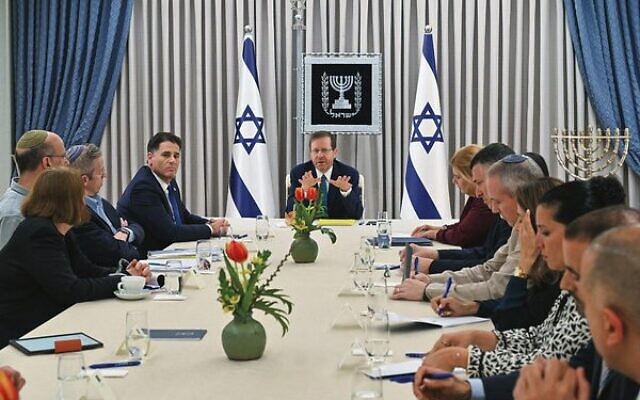Talks on anchoring fundamental rights in law
His predecessors Naftali Bennett and Yair Lapid denounced his claims, with Bennett calling his speech shameful and Lapid telling him to "take responsibility".

Negotiation teams for the coalition and opposition parties over the Israeli government’s controversial judicial overhaul program this week discussed the possibility of anchoring in law fundamental civil rights, amid efforts to hammer out a compromise on the shake-up bid.
Such a measure is a key demand of the Yesh Atid party and other opposition factions for any comprehensive solution to the political and constitutional storm that has erupted over the coalition’s plans to radically revamp Israel’s legal and judicial systems.
The two sides are also trying to formulate a comprehensive reform package covering all major constitutional issues raised by the government’s legislation in the Knesset’s winter session.
The government’s reform agenda included legislation that would have given governing coalitions almost complete control over judicial appointments to all courts in Israel, while radically reducing the ability of the High Court of Justice to strike down unconstitutional laws and allowing the Knesset to make legislation immune to High Court review in the first place.
The judicial appointments legislation was set to be passed into law at the end of March, but mass protests, widespread strikes and the intense opposition of some critical IDF reserve units forced the government to back down and enter a negotiation process.
A senior government source said that a framework for anchoring fundamental civil rights was discussed on Monday and previously by the negotiating teams as part of the overhaul reform package.
Israeli Prime Minister Benjamin Netanyahu alluded to these negotiations during a press conference on Monday evening, when in response to a question regarding the judicial overhaul, stated: “We will anchor in the basic laws fundamental rights and we will not injure [the rights] of women, LGBT communities, or the ultra-Orthodox.”
One of the key arguments of opponents to the government’s judicial overhaul package is that it would give the government and Knesset almost unrestrained power and remove the checks on such power provided by the High Court of Justice.
Anchoring fundamental rights in law would constitute a major step toward alleviating these fears.
The government official also acknowledged that the goal of the negotiations was to reach an agreement on a broad reform package.
“The intention is to discuss all the issues and to try and come to agreement on all those issues. Whether or not we succeed there is no way of knowing,” he said.
He said the issues under discussion were broadly those covered by President Isaac Herzog’s proposed “People’s Plan” but insisted that the coalition “totally rejects” the positions proposed in that plan.
If agreement can be reached on the Judicial Selection Committee, dealing with the other major issues would be easier, the source said.
Another source closely familiar with the negotiations said the discussions on Monday were held in a generally good atmosphere and that the different negotiating teams “came into the room in good faith”.
The source noted that wide gaps still exist between the two sides.
The source added that the sides are trying to see “if they can reach an agreed-upon reform that would be wider in scope than proposed by the government” and would include a Basic Law: Legislation, a bill that would go a long way in defining the relationship between the Knesset and the Supreme Court.
“The aim is to do a comprehensive deal and, so far, the coalition appears inclined to be receptive to this demand,” said the source.
Three marathon discussion sessions are scheduled to be held next week to try and reach agreement on some of the key details of the major issues.
TIMES OF ISRAEL

comments